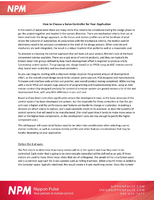Two New Standards address sintered powder metallurgy testing.
Press Release Summary:
Test Methods for Density of Compacted or Sintered Power Metallurgy (PM) Products Using Archimedes' Principle (ASTM B962) provides means to determine volume in order to calculate density of complex 3D shapes. Also available, Test Methods for Oil Content, Oil-Impregnation Efficiency and Interconnected Porosity of Sintered Powder Metallurgy (PM) Products Using Archimedes' Principle (ASTM B963) is used for powder metallurgy QC or compliance purposes.
Original Press Release:
Two New Sintered Powder Metallurgy Standards Available from ASTM International
W. CONSHOHOCKEN, Pa., 3 April 2009-Two recently approved ASTM International standards provide user-friendly tests for properties of sintered metallurgy products.
The new standards, developed by Subcommittee B09.04 on Bearings, are ASTM B962, Test Methods for Density of Compacted or Sintered Power Metallurgy (PM) Products Using Archimedes' Principle, and ASTM B963, Test Methods for Oil Content, Oil-Impregnation Efficiency and Interconnected Porosity of Sintered Powder Metallurgy (PM) Products Using Archimedes' Principle. Subcommittee B09.04 is part of ASTM International Committee B09 on Metal Powders and Metal Powder Products.
According to W. Brian James, Hoeganaes Corp., and B09 member, both new test methods are based on tests originally contained in an older standard, ASTM B328, Test Method for Density, Oil Content and Interconnected Porosity of Sintered Metal Structural Parts and Oil-Impregnated Bearings. However, Subcommittee B09.04 decided that, for ease of use, the tests would better serve users in separate standards.
The purpose of ASTM B962 is to provide the means, through use of Archimedes' principle, to determine the volume in order to be able to calculate the density of complex three-dimensional shapes such as those formed and used in the powder metallurgy industry.
Test methods for oil content, oil-impregnation efficiency and interconnected porosity have been revised for the new standard, ASTM B963. James says that results of the tests covered in ASTM B963 will be used for powder metallurgy quality control or for compliance purposes.
All interested parties are invited to participate in the interlaboratory study that Subcommittee B09.04 is currently planning to determine the precision of the test methods.
ASTM International standards can be purchased from Customer Service (phone: 610-832-9585; service@astm.org) or at www.astm.org.
For technical Information, contact W. Brian James, Hoeganaes Corp., Cinnaminson, N.J. (phone: 856-303-2741; wbrianjames@comcast.net). Committee B09 meets April 26-29 in Hollywood, Fla.
ASTM International welcomes and encourages participation in the development of its standards. ASTM's open consensus process, using advanced Internet-based standards development tools, ensures worldwide access for all interested individuals. For more information on becoming an ASTM member, please contact Christine Sierk, ASTM International (phone: 610-832-9728; csierk@astm.org).
Established in 1898, ASTM International is one of the largest international standards development and delivery systems in the world. ASTM International meets the World Trade Organization (WTO) principles for the development of international standards: coherence, consensus, development dimension, effectiveness, impartiality, openness, relevance and transparency. ASTM standards are accepted and used in research and development, product testing, quality systems and commercial transactions around the globe.




